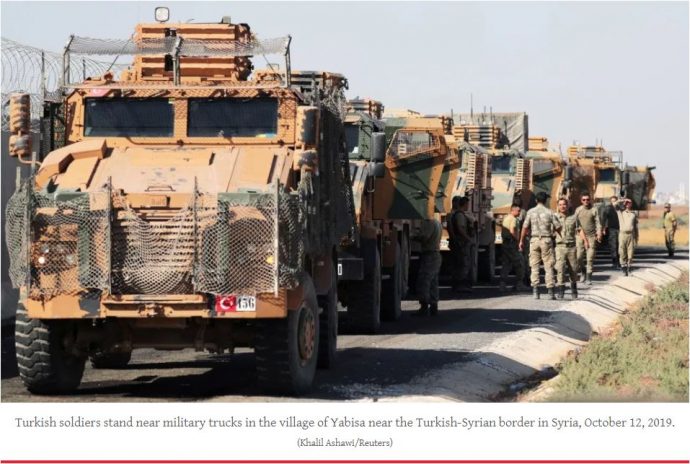Victor Davis Hanson weighs in on Turkish ironies:
Many of the critics demanding that we restrain our NATO ally Turkey are precisely the same who have damned Trump for undermining the NATO alliance by loudly reprimanding allies for not keeping their promises of military contributions. Yet an American presence in between the Kurdish and Turkish trajectories may not necessarily serve as a successful deterrent to violence given our present limited deployment. If all Trump has done for now is to remove a few dozen Americans from a “trip wire” deployment between the two belligerents, he can hardly have “sold out” the Kurds.
Otherwise, our presence in the firing line could raise the specter that we’d either refuse our Article V (collective defense) commitments to Turkey that Erdogan might cynically invoke in a larger war in Syria, or we’d find ourselves actually killing Turks to save Kurds. Either of these scenarios is theoretically quite possible, and both would be far more injurious to the spirit and cohesion of the presently composed NATO alliance than asking Germany and its followers to pony up the contributions that they had long promised.
As I understand the present outrage, the logic goes like this: It is a sellout to leave the Kurds vulnerable to the Turks, and it undermines our noble promises and our credibility in a way that ignoring our ignoble, legal commitments to Turkey do not. That may be a legitimate assumption that we all would like to embrace, but it is not yet the policy of the United States.
Also, there are Kurds — and then there are Kurds. Given the century of broken promises about the birthing of a Kurdish super state of some 30 million, the Kurds now compose minority populations in Iran, Iraq, Syria, and Turkey, among other smaller countries. The agendas of these disparate groups, again in lieu of an independent Kurdistan, are not uniform; they range from advocacy of free markets and consensual government to authoritarian Communism and Islamism.
These sometime disparate factions, to varying degrees, can employ both honorable methods of resistance and occasional abject terrorism against both our Turkish allies and our Iranian enemies. In other words, as minorities that form less than 25 percent of the population of their four host nations, 30 million Kurds are diverse groups that do what they think they must to survive. Their survival strategies do not always assure compliance with U.S. anti-terrorist protocols. Our allied Syrian Kurds of the YPG in Syria, for instance, are also affiliated with the Kurdish PKK inside Turkey — a group that has often committed terrorist attacks on Turkish civilians and authorities.
Read more: National Review
Image credit: www.nationalreview.com.

